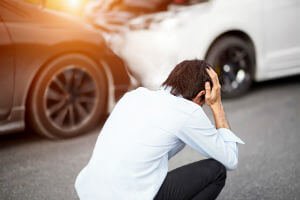Blog
How Can I Be Compensated After an Out-of-State Car Accident?
Posted on behalf of Peter T. Nicholl in Car Accidents Published on July 24, 2020 and updated on March 4, 2022. Being injured in a car accident can already be a traumatic experience, but when it happens while driving in another state, it can be even more overwhelming. You may be unsure if your damages will be fully covered because you are outside your state of residence. Fortunately, there are certain steps you can take to help protect yourself.
Being injured in a car accident can already be a traumatic experience, but when it happens while driving in another state, it can be even more overwhelming. You may be unsure if your damages will be fully covered because you are outside your state of residence. Fortunately, there are certain steps you can take to help protect yourself.
Our licensed attorneys are prepared to discuss some unique factors that could affect your claim during a free legal consultation. There is no risk in calling us to learn more and no obligation to hire our law firm.
Steps to Take After an Out-of-State Car Accident
It is important to know hot to handle yourself after being involved in a car accident, regardless of the state you are in. Below are some steps to help make the claims process more effective and efficient:
- Move to a safer area – If it is possible, move your car to a safe place away from traffic to avoid another crash. Try to direct the other party to move over to the shoulder or off the main road if his or her vehicle is still operational.
- Check for injuries – Determine if you or anyone else is injured. If so, call 911 to get an ambulance and police at the scene. Even in a minor accident, it is important to still contact law enforcement so an official report could be filed.
- Do not admit fault – Even offering an apology could be misconstrued as admitting fault. It could hurt your ability to recover compensation for any damages you sustained. What you say after a car accident can be used against you during the claims process with an insurance adjuster.
- Exchange information – Write down the other driver’s name, contact details, name of the insurance company, the policy number, and any phone number listed on the insurance card. Be sure to also exchange information with anyone who may have witnessed the car accident.
- Document the crash – Gather as much evidence as you can. Take pictures of the accident scene, visible injuries, property damage and personal notes on what happened during the incident.
Before reaching out to the insurance company, we recommend consulting with a legal professional. A Maryland car accident lawyer from our firm will have your best interests in mind unlike an insurance adjuster, whose main goal is to save the insurance company money by paying as little as they can in claims.
Car Insurance Coverage in Maryland
Having adequate car insurance coverage allows you to help pay for damages and secure compensation for your injuries. Maryland law requires that all drivers carry liability insurance that covers up to $30,000 for bodily injury or death of one person in an accident, up to $60,000 for bodily injury or death of one or more persons in an accident, and up to $15,000 for damage of property.
If the at-fault driver is found liable for a higher amount of damages, he or she may be required by the courts to pay out-of-pocket. If the at-fault driver is not a resident of the state, the insurance company may modify their limits to meet the minimum requirements of the state where the crash happened.
Aside from liability insurance, drivers often choose to increase their existing policy limits for uninsured/underinsured motorist coverage in the event the at-fault driver has no insurance or not enough insurance to cover their damages.
Additional types of optional coverage can also be purchased to better protect yourself in the event of a car accident. If you have a loan on your car, this could include collision and comprehensive coverage.
Options for Pursuing Compensation
Maryland follows a fault-based system and like other at-fault states, the party responsible for causing the crash is also responsible for any resulting damages. You could pursue compensation for your losses by filing a claim with the at-fault driver’s insurance company, filing a third-party claim directly with the at-fault driver’s insurance carrier, or filing a lawsuit in court against the at-fault driver.
But what if you are involved in a crash in a no-fault state? If this happens, your options will be different. You would have to go through your insurance company and use your personal injury protection or PIP coverage to help pay for your medical bills and other out-of-pocket costs, regardless of who was at fault.
It is important to note that you can only step outside the no-fault rules and file a claim against the at-fault driver if your medical bills reach a certain threshold or your injury is deemed to be serious enough.
Reach Out to Our Law Firm Today
Being in an out-of-state car accident can be scary and leave you feeling helpless. You may be unsure about what to do and have so many questions that need to be answered. At The Law Offices of Peter T. Nicholl, we have helped many accident victims pursue maximum compensation for their damages.
Allow us the opportunity to review your situation in a free consultation. We charge nothing up front and only get paid if we help you obtain a recovery.
No Risk. No Obligations. Call 410-244-7005.

